Jed Morgan, one of the nation’s most exciting young pros, sits down to chat about his journey from junior golf clinics to winning on Australian golf’s biggest stage.
When you ask Jed Morgan what he’s most grateful for in the game of golf, it’s not the glory of smashing Australia’s best touring pros by 11 shots to win the Australian PGA Championship earlier this year. Although that was fun. And it’s not the $180,000 winner’s cheque, either. Although that was nice.
It’s the friendships he’s made along the way.
Among the talented pros 21-year-old Morgan left in his wake at Royal Queensland during his Australian PGA triumph was the very gifted Louis Dobbelaar, who finished third. Dobbelaar and Morgan have been best mates since meeting as junior golfers 10 years ago during sessions in the Kookaburra Club, a junior program started at Brookwater Golf & Country Club in Brisbane by popular coach Jay Simpson.
“You make so many friends through these types of programs,” Morgan tells Australian Golf Digest. “One of my best mates is Louis Dobbelaar, and we started together in smaller programs like Kookaburra Club at Brookwater. It’s just great to meet friends through golf, and if it works out that you’re pretty good at golf, you can push each other to new levels and congratulate each other on your performances.”
Dobbelaar and Morgan now share a golf coach in Grant Field, an elite golf whisperer who also teaches four-time PGA Tour winner Cameron Smith. Smith and Dobbelaar have both been students of Field’s since the age of 10, while Morgan came on board last year.
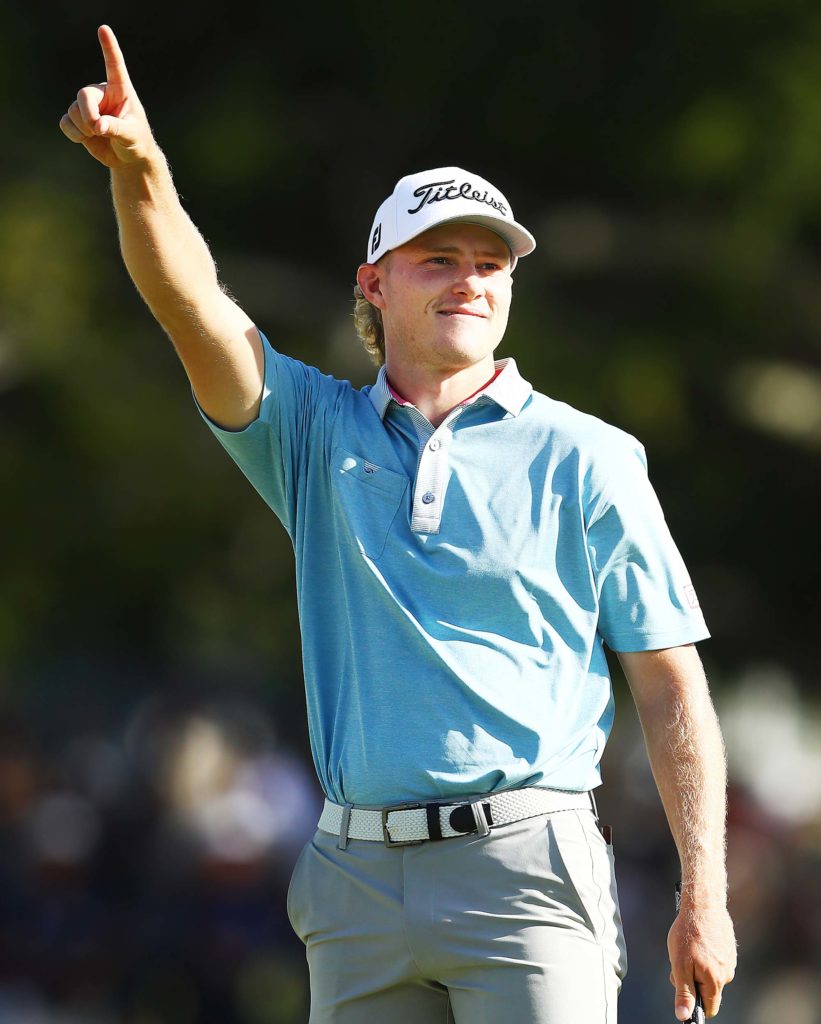
Friendships like the one he built with Dobbelaar were a lure when Morgan had to make a decision between rugby league and golf as a young teenager. Simpson sat down with Morgan and his parents for that conversation when Morgan was about 14. In the chat, it was made clear to Morgan by his parents that he had their support either way, but he needed to choose between footy and golf.
“Jed was always athletic… fast, lanky, every word that you can describe an athlete that could do everything,” Simpson, who created Kookaburra Club while he was a trainee pro at Brookwater, recalls of a younger Morgan.
“But I think his golf game spoke for itself, really. I think he knew that he was really good at golf. He didn’t need his parents, or me, to tell him how good he was. It was more of a personal decision that he needed to have put in front of him by someone saying to him, ‘Mate, you’re a really good rugby league player, but what are the chances you get a career out of it? And then you’ve got golf. What are the chances you’re going to make a career out of golf?’ And I think the big thing was… he could play golf for the rest of his life, whereas rugby league, you’re going to get to a certain age when you’re going to think, Crap, what am I going to do now?
“We talked about going to America for golf. I think the big thing was college, talking about him possibly going over to America and getting a scholarship over there. And it dawned on him that there was a lot more opportunity with golf than there was with rugby league.”
Morgan admits that after he’d chosen golf, he held a small concern that he’d picked an individual sport – a problem for a gregarious and social guy. But those fears were quickly dismissed when junior programs and state teams allowed him to regularly mingle with large groups of like-minded kids for hours at a time.
“Junior programs are massive because I grew up playing team sports and, at first, I missed that because golf is an individual sport,” Morgan says. “But then you realise you can actually make so many friends through junior golf programs.”
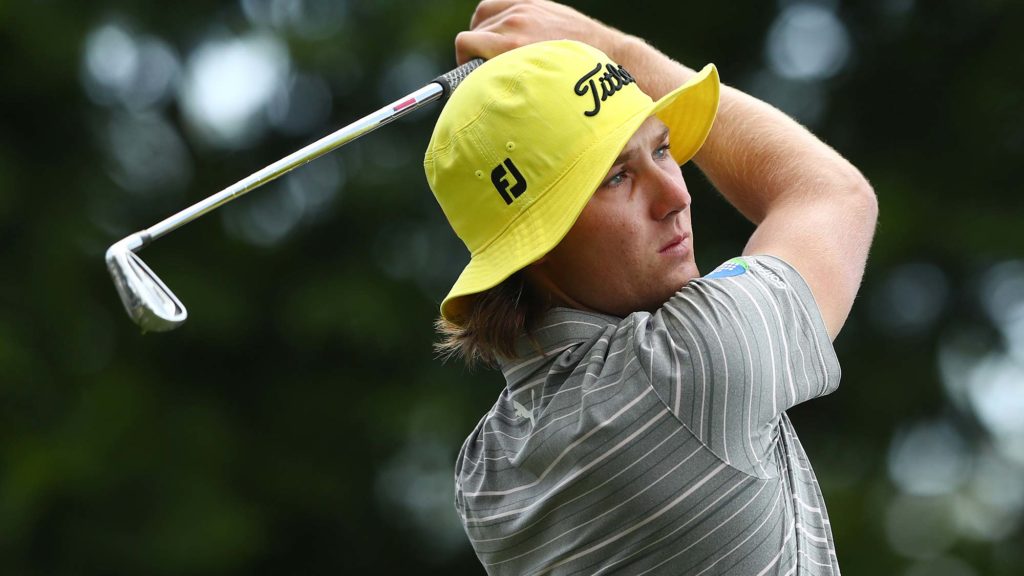
Morgan was exceptionally talented and eventually became a member of Royal Queensland. As a teenager and a top amateur, Morgan’s golf game took off under the watch of accomplished coach Chris Gibson. As Morgan was readying to turn pro in October last year, Morgan then came across to Field’s elite stable. He also counts Tony Meyer – a high performance manager for Golf Australia covering Queensland – as a mentor.
“I’ve been very fortunate to have had these types of people in my corner for a long time. ‘Simmo’ and ‘Gibbo’ are still great friends, and Grant is obviously a world-class coach. My Australian PGA Championship win was a win for everybody, really.”
While Field has performed some technical tweaks to Morgan’s swing in his takeaway and sequencing, perhaps Field’s most valuable advice for Morgan was to “go out there and be himself” during his Australian PGA win. Being at the top of the leaderboard, from the second round onwards, brought on a bad bout of nerves.
“I was feeling sick in the stomach; I could barely eat,” Morgan recalls.
Instead of trying to remain stoic, Field encouraged Morgan to fist pump on every shot, to embrace his friends and family cheering for him in the crowd and to get excited in a positive way.
“I really noticed in the first round, he was engaging with the crowd, he was laughing and joking and talking to his playing partners and he looked like he was having a good time,” Field tells Australian Golf Digest. “That’s who Jed is. He is happy, he’s loud and very personable. To play your best golf, I think you need to be true to who you are and your emotions.
“I called Jed after the first round, not because he shot six-under, but to say the way he was on the course was great. It’s how he needed to be as often as possible, in my opinion. I think did an amazing job of that during the whole week.”
Morgan went on to win by 11 shots. He smashed the tournament’s previous margin of victory record of eight shots, achieved by American great Hale Irwin (1978) and twice by Greg Norman (1984 and 1985). Morgan says the biggest takeaway from his Australian PGA win is knowing he now has the ability to use nerves to his advantage.
“I was aware I was nervous and, apart from some good breathing techniques, I used the extra energy of being nervous as a way to sharpen my focus on what I could control,” he says. “I wanted to play smart golf and avoid mistakes but be aggressive when it was warranted.
“I do feel anxiety and stress and anger and happiness on the golf course, but you’ve got to pick and choose what level you need to operate on.”
Morgan is all but assured of a card on the DP World Tour (formerly European Tour) at the end of 2022, because the top three money earners on the PGA Tour Australasia Order of Merit will be given a one-year card to play there. That is due to a partnership between the Australian and European organisations. Morgan’s PGA triumph alone comes with three DP World Tour starts later this year.
“I’m in a good position to win the order of merit, so I want to make sure I do that, and take it from there,” Morgan says. “I’ve got a few starts in Europe in July and August, and then we’ll just see what happens through the middle of the year. Towards the end of this year, I will probably go to the final stage of the Korn Ferry Tour in the US as well.”
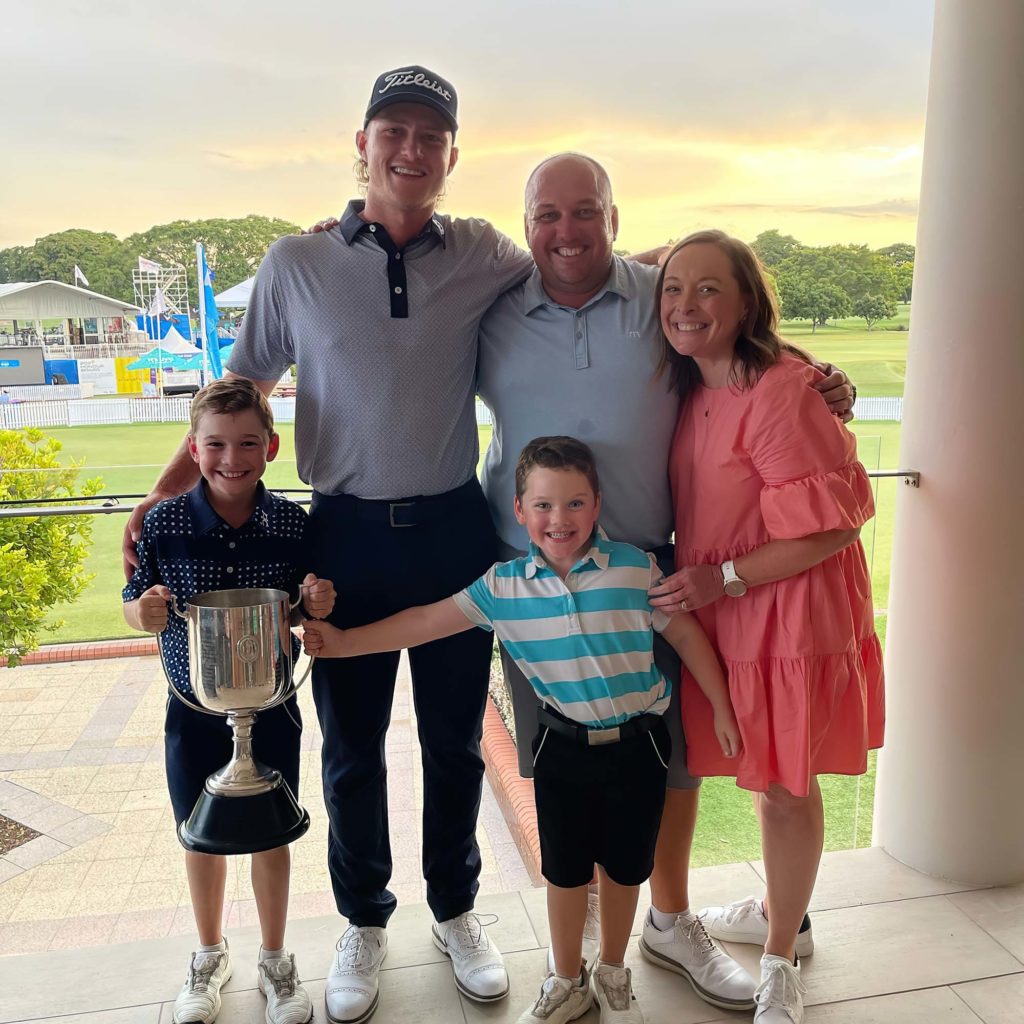
LEARNING FROM THE BEST
Aside from the lessons learned from his Australian PGA breakthrough, Morgan says he will also draw on observations made during invaluable time spent with PGA Tour star Smith. Smith created a scholarship for Queensland junior golfers and, in 2018, when Morgan and Dobbelaar won the scholarship, Smith paid for the duo to fly to the US to practise and play with him for a week at his home in Ponte Vedra, Florida.
There the penny dropped for Morgan. He was able to see how sublimely talented Smith is with a golf club in the physical sense, but he realised it’s Smith’s attitude and mentality where he has most excelled. Smith has allowed himself to become more confident in the US, a country where a heightened self-belief is encouraged among elite athletes.
“The biggest improvement I’ve seen is the way Cam thinks in a golf environment,” Morgan says. “Growing up in Australia [there seems to be a limit] in terms of how confident you should be. But if you want to be competitive with the world’s best, on the PGA Tour, you need to be more confident and Cam has grown in that way.
“That’s how he was able to stare down Jon Rahm and beat him at the Tournament of Champions on Maui. It’s been amazing that I’ve gotten to meet Cam, spend some time with him and get that kind of advice.”
Smith isn’t the only elite athlete Morgan has spent time with. He’s also picked the brains of cricket icon Ricky Ponting and former baseball star Graeme Lloyd – an Australian who pitched for seven Major League Baseball franchises including the New York Yankees. Morgan was put in front of the two stars courtesy of a Sport Australia Hall of Fame Scholarship.
“Spending time with those two guys, it was amazing to hear how it is possible to drown out the noise and focus in some of the biggest sporting arenas in the world,” Morgan says.
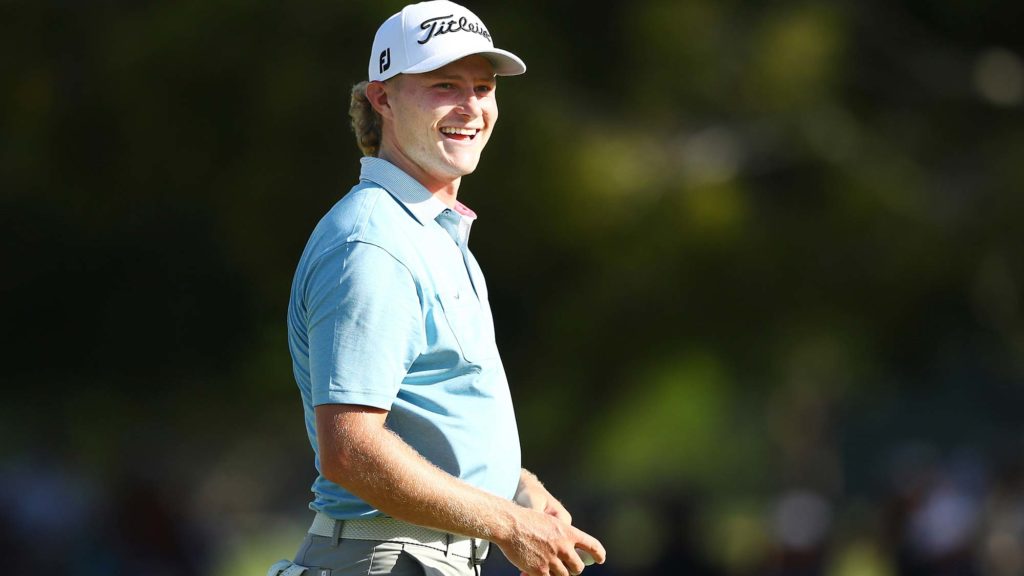
HAILING FROM HATTON VALE
Plenty of people have helped Morgan become a professional golfer, but Morgan says his parents deserve a lot of the credit. Morgan’s parents ran the Hatton Vale Golf Course and Fairways Tavern for 25 years. Hatton Vale is an hour west of Brisbane.
“When I was growing up there, I didn’t realise like how good I had it,” Morgan says. “My parents weren’t wealthy at all; they were just making ends meet. They worked their asses off so that me and my two younger brothers and my older sister could have a good childhood.
“I’d get out before school and I’d go play three or four holes at Hatton Vale, then I’d come back and I’d play three or four holes again and do it all again the next day.”
Morgan’s parents, father Laurie and mother Julie, funded his amateur career – an expensive exercise full of overseas and interstate trips. Among those trips was a journey to the US in 2018 for the US Junior Amateur at New Jersey’s renowned Baltusrol Golf Club. Morgan made the matchplay portion of the event and it helped him secure the Cam Smith Scholarship a few months later.
In 2018, Laurie Morgan told a Brisbane newspaper that Jed and his siblings were all keen golfers. But it was Jed who had the desire to be a pro. “All three boys and our daughter started playing golf very young,” Laurie said in 2018. “Jed had a very good swing, he’s gone along and progressed extremely well. Over the past five years he’s shown he has some tremendous talent. I’m very proud. He’s worked hard, he’s got an extremely good work ethic and understands what it takes.”
One man who knows what it takes is Geoff Ogilvy, the 2006 US Open champion. Playing alongside Morgan at the Australian PGA, Ogilvy saw what he’d already heard – Morgan had the X-Factor.
“He’s got the golf world at his feet, if it all works out, and he plays well and he takes his opportunities,” Ogilvy said at Royal Queensland.
“My parents have been dining out forever that they saw Greg Norman win the West Lakes Classic in 1976. Nobody knew who he was and he turned up and he won, and the rest is history. Same goes here; Jed might be [the next] Greg Norman.”
Time will tell just how good Morgan can be on the professional stage, although he has made light work of his first few months in the paid ranks. One thing is certain, Morgan will have the friendship and healthy competition from one of his best mates, Dobbelaar,
as the pair take on the golf world.
“I remember when I used to see Louis in on the range all day, every day, at Brookwater,” Morgan recalls. “Then we became mates and went through Metropolitan West (an elite regional Brisbane golf squad) program together. After that, we went through the Queensland state team and we represented Australia a couple of times. Now we’re traveling together as professionals. It’s been cool to do it with one of my best mates.”
Morgan ends his interview with Australian Golf Digest by thanking the publication for taking time out to tell his story, which is only just beginning.
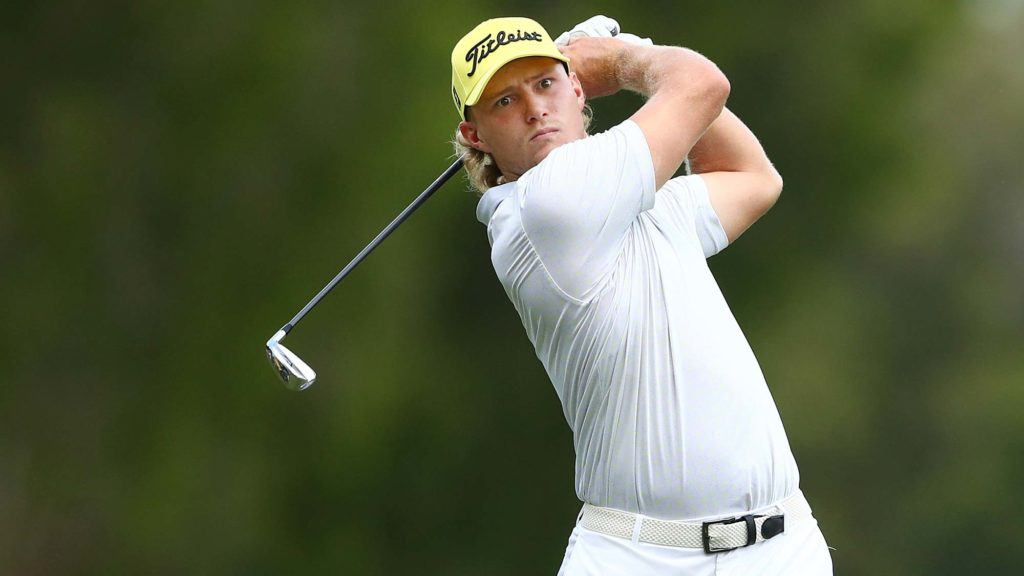
First Swing
Jay Simpson has created a pathway to get Queensland kids interested in golf. First Swing – which uses modified equipment to teach boys and girls the fundamentals of golf on traditional and non-traditional facilities – is now delivered at more than 180 schools.
“We make an effort to make golf fun for kids,” Simpson says. “It was all game-based learning. It wasn’t technical. We don’t tell them where their hands should be. We just let them swing the golf club. And as we do it, we make it fun along the lines with our little phrases that we use and sayings that keeps the kids engaged.”
First Swing engages participants through programs designed to kick-start a life long love of the game of golf, using a fun, active and inclusive approach. First Swing delivers programs at traditional and non-traditional facilities using modified equipment. The programs teach the basic fundamentals and have been developed by Australian PGA professionals with more than 20 years’ experience combined.
“The idea for the First Swing came from when I spent a few years in Canada and saw how many juniors they had playing the game,” Simpson says. “I wanted to create a starting point for kids who had never played golf before, and then as they got older and developed some basic skills, they could move into a MyGolf program at a golf club.
“First Swing is a franchise business and we now have a program that starts with grassroots beginners all the way through to junior members. If a golf club doesn’t have a dedicated junior program in place, we now have something that we can offer for every level until they become junior members.”
See firstswing.com.au for more details.



